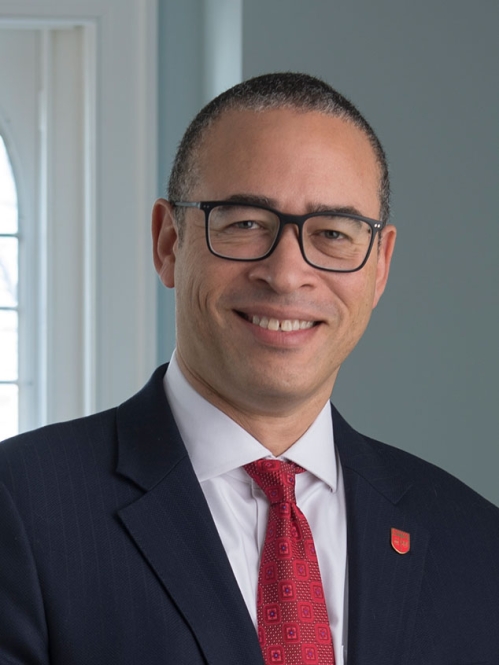Jonathan Holloway
Rutgers' 21st President, 2020 to 2025

Summary
“I believe Rutgers for too long has shied away from embracing aspirations worthy of its potential,” Jonathan Holloway declared at his inauguration—a ceremony delayed more than a year by the coronavirus pandemic that was in full force when he took office. “We have been cautious about telling the world who we are and what we can become. While we should not let hubris be our guide, let us be unafraid to be bold, comfortable in our skin, and confident in our abilities.” During his five-year presidency, Rutgers surged in the national rankings, drew the highest number of applicants and largest incoming class in its history, approached $1 billion in annual research activity, and set new records in fundraising.
Biography
Born in Hawaii in 1967 to Kay and Wendell Holloway, an U.S. Air Force lieutenant colonel, Holloway grew up in Alabama and Maryland, excelling in high school football and track. He earned a B.A. in American studies from Stanford University and a Ph.D. in history from Yale University. Beginning his academic career on the faculty at the University of California, San Diego, he returned to Yale in 1999 to serve on the history faculty, later serving as the dean of Yale College. In 2017, he became provost of Northwestern University before accepting the Rutgers presidency.
In his opening message to the Rutgers community, Holloway stated, “I am proud that I now have the privilege and the responsibility to lead an institution that is committed to making the world better while also opening its doors to that world. As your president, I promise to do all that I can to amplify Rutgers’ excellence, to emphasize its contributions to society, and to ensure that it remains accessible.”
Holloway’s tenure at Rutgers began in July 2020, when much of the nation, including Rutgers, was in lockdown because of the COVID-19 pandemic. He developed a Faces & Voices of Rutgers video series, conducting one-on-one interviews with students, alumni, faculty, and staff to illuminate excellence across the university at a time when so many Rutgers activities, including most courses, were forced online.
When in-person learning resumed, Rutgers became one of the first universities in the nation to require students to be vaccinated against COVID-19, with exceptions for health or religious reasons. Holloway traveled frequently to meet with alumni groups across the country and in Europe, helping to set fundraising records for Rutgers both in overall dollars and in the number of individual donors.
Building upon Rutgers’ historical strengths, Holloway championed three priorities: ensuring access to educational excellence; building community; and advancing the common good.
Access and Excellence: On Holloway’s first day he launched a $10 million fundraising campaign (later expanded to $50 million) targeted at Rutgers Scarlet Promise Grants—small financial aid grants to help students struggling to pay tuition and remain on course for graduation. His efforts to emphasize and promote the university’s outstanding faculty and research excellence helped Rutgers rise significantly in the national rankings, with all three regional campuses ranked among the top fifty public universities in the United States. Seeking to streamline the university’s operations, he secured Board of Governors approval for creating a unified Rutgers School of Medicine that merges the two medical schools under a single dean, and established a single deanship for Rutgers Law School. He worked with the university’s chief academic officer, Prabhas Moghe, to establish Roadmaps, a $30 million initiative funding chancellor-led projects on each campus and at Rutgers Health to elevate the university’s academic distinction.
Community: Seeking the goal of inclusive excellence, Holloway commissioned the university’s first Diversity Strategic Plan and initiated a five-year, $45 million faculty diversity initiative. During the COVID-19 pandemic, he established a task force on the future of work, whose implemented recommendations included a presidential award program celebrating exemplary employees, a caregiver support pilot, and flexible work arrangements. He also helped secure a $15 million grant from the Andrew W. Mellon Foundation to establish the Institute for the Study of Global Racial Justice, a multidisciplinary scholarly project with centers in New Brunswick, Newark, and Camden. In 2021, he endorsed a university-wide Climate Action Plan with a goal of carbon neutrality across all Rutgers campuses by 2040.
Common Good: In his 2021 New York Times essay, Holloway proposed requiring one year of public service for all young people in the country as a means of strengthening democracy and improving civil discourse. Acting on that idea, he established Rutgers Scarlet Service, an initiative to place undergraduates in stipend-supported summer internships at nonprofit agencies and public-facing government offices. Holloway also commissioned a task force on public engagement and helped to create the Rutgers Democracy Lab, a multi-pronged initiative to instill a civic engagement ethic within the Rutgers curriculum and help students take an active role in supporting and enhancing democracy. Related to these efforts, Holloway taught a first-year seminar course focused on the responsibilities of citizenship and featuring conversations with prominent leaders in government, nonprofits, journalism, and the corporate world that were filmed and made publicly available.
Holloway built strong relationships with New Jersey’s governor and legislature, yielding new investments in Rutgers, including support for the HELIX project in New Brunswick, to include a new home for the medical school and a center for translational science; major construction and renovation projects along Cooper Street in Camden; and the renovation and expansion of the medical school’s Medical Science Building in Newark. In the final year of his presidency, Holloway helped open the Jack & Sheryl Morris Cancer Center, the state’s first freestanding cancer hospital.
In announcing his decision to step down after five years, Holloway wrote, “Incredible intelligence and ambition abound in our community, to be sure, but they are matched by an enduring empathy and compassion. It is that remarkable combination that enables our university—our Rutgers—to make New Jersey, our country, and the world a better place.”